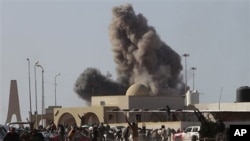Libyan rebels are fighting back against government forces between Bin Jawwad and Ras Lanuf, towns marking the shifting frontlines of the past few days.
Witnesses say Libyan warplanes struck positions around the oil port of Ras Lanuf Monday. Residents were seen leaving the town earlier, expecting an attack by pro-Gadhafi forces after assaults Sunday on other rebel-held cities.
An official in the de facto rebel administration in Benghazi conceded Monday that rebel forces had to pull back from Bin Jawwad the day before. But Khaled Sayeh, the military-civilian liaison, offers an explanation that would be incendiary if true.
Sayeh says pro-Gadhafi troops used women and children of the town as shields to protect themselves, forcing the rebels to retreat.
Using civilians as a human shield is a war crime, and Sayeh's accusation is not the first made during the conflict.
Libyan leader Moammar Gadhafi repeatedly accuses al-Qaida of fomenting the popular uprising, drugging Libyans to ensure chaos. In an interview Monday with France 24, he also accused Western media of ignoring what he called the broad support enjoyed by his government.
His is a dubious claim, given that the eastern half of Libya is now in rebel hands. But it is perhaps no less credible than the figure offered Monday by former Interior Minister Abdel Fattah Younis, a top defector to the rebel cause. He says 90 percent of the country is under opposition control.
Everyone, it seems, has something to say about what is being said. Aimen Areibi, an air traffic controller at the now-closed Benghazi airport, says the government shutdown of the Internet and the curtailing of telephone service doesn't help.
"When there is a rumor that has been made by the government on TV, on the local TV - they say that they took Tobruk and they dropped many soldiers there to get it back - the problem is you can't ask the people in Tobruk about the situation over there to find out what's going on," said Areibi.
For all the confusion, what is clear is that some sort of impasse has been reached in the battle, with neither side appearing to give their all in the fight against their fellow Libyans. Government airstrikes miss their apparent targets with regularity. Rebels have yet to move much of the vast arsenal they have captured up to the front lines.
Not that the battles have been bloodless, as the ambulances speeding out of Ras Lanouf will attest.
Which may be why former Prime Minister Jadallah Azous al Talhi Monday called on leaders in the rebel-held east to engage in dialogue with the government. He said he is seeking open communication to end the violence.
Libyan Unrest Heightened by Information Battle




